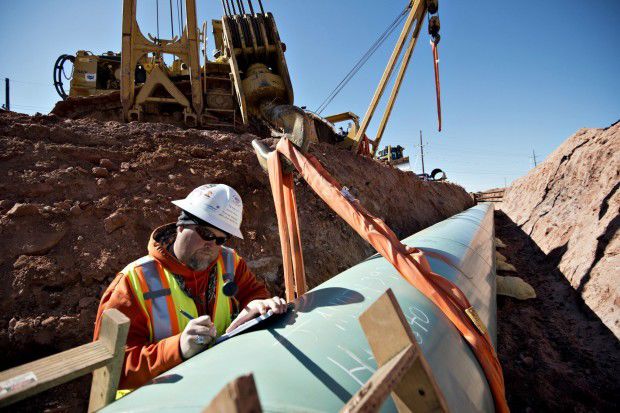Oil Worker Jobs are Locked Up, and They Just Threw Away the Key
Covid-19 has affected the world at the global scale like no other event in recent history has, and this is evident when viewing the state of the United States economy. According to NBC News, “22 million jobs disappeared at the start of the pandemic. Only 12 million have been recovered, leaving another 10 million to go.”
This is certainly a daunting figure, but yet, on his first day of presidency, Joe Biden announced the fourth stage of the Keystone XL pipeline would no longer be commencing. This reverses the decision made by previous president Donald Trump in early 2017 intended to allow the completion of said pipeline. The decision made by sitting president Biden has come with a great deal of controversy due to the amount of jobs that have been made obsolete through the pipeline’s cancelation. The CEO of TransCanada, the company that owns the pipeline stated in a 2011 Fox News interview that the fourth stage of the pipeline’s construction would greatly benefit the American economy, “putting 20,000 US workers to work and spending $7 billion stimulating the US economy.”
So, the question then stands, why would the president, with full knowledge of the level of unemployment ravaging the country, choose to let 20,000 high skilled workers fall to the same fate as ten million other Americans?
Well, it’s a complex issue. The National Resources Defense Council thoroughly outlined the issues that have caused the controversy of the pipeline. The main point of contention for those against the pipeline’s construction is based on the likelihood that the pipeline will leak. This is due to the fact that “Tar sands oil is thicker, more acidic, and more corrosive than lighter conventional crude.” The Keystone XL pipeline will carry this type of oil, and thus has a great likelihood of causing spills. Additionally, due to the massive amount of construction delays, the pipes themselves have been exposed to the elements for long enough to render their anti-corrosive coatings useless.
Another area of concern is the difficulty presented in detecting oil spills of Tar Sands type oil. Its density makes it sink to the bottom of waterways in the case of a leak, meaning that if there is indeed a leak, it will be hard to find, and even harder to clean up.
The amount of jobs provided by the pipeline is also heavily debated. Yes, TransCanada stated that 20,000 US jobs would be created in its construction, but are we really going to believe the findings of the company responsible for building the pipeline? In reality, it’s more likely that only around 5,000 direct jobs would be created during construction according to the U.S. State Department. Additionally, facts surfaced stating that TransCanada was counting the potential jobs created on a yearly basis rather than overall. This was seen by the public as a blatant attempt to spread misinformation, a sentiment that seems true when examining the facts.
In reality, though, the issue of the Keystone pipeline’s construction is a lose-lose whether it is built or not. There are already previously constructed pipelines meant to be connected by Keystone XL, and the decision to halt the construction of the main pipeline doesn’t affect those existing pipelines in the slightest. If the main line isn’t constructed, it will mean very little for the environment due to the existing lines, and will just cost jobs, no matter the number. If it were to be built, it’s likely that less jobs would be created anyway, and there would be a likelihood of leaks occurring.
Regardless, the decision is already made, and it’s not likely that anything will result to change the decision. Overall, the whole issue is a saddening reminder that no matter what decision is made in politics, there will always be a losing party.


